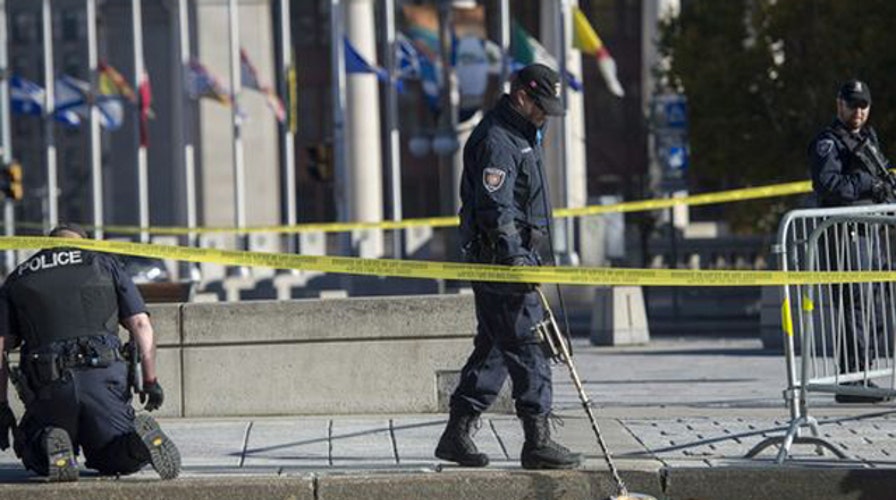This is a rush transcript from "The Kelly File," October 24, 2014. This copy may not be in its final form and may be updated.
MEGYN KELLY, HOST: Joining me now Mike Baker, a former CIA covert operations officer and president of Diligence LLC, a global intelligence and security firm.
And that's the problem Mike, is that if you live in a free and open society, there's only so much we can do to track the lone nutcase. And I don't mean to diminish what they're doing, these are terrorist acts to be sure, but this guy was also a nutcase. And there's only so much we can do to track them.
MIKE BAKER, FORMER CIA COVERT OPERATIONS OFFICER: That's absolutely right. And the problem -- one of the problems in trying to prevent these lone wolf style attacks is that there are a number, maybe countless number of scenarios of types of individual from, as you mentioned, the nutcase who just latches on, he's drifting through life depressed, mental health issues, whatever it is, and he latches onto something. And in this case, Islamic State or Al Qaeda ramblings online.
And then there's the actual convert or, you know, Muslim who is in sort of a classical sense is radicalized, a true believer.
But from the Islamic State's perspective or Al Qaeda's perspective, they don't care who they attract to carry out these attacks. They don't care whether it's a psychotic individual or whether it's actually a true believer. As long as they commit an act of terror, from their perspective they've won.
KELLY: You know, it's like the Internet has almost in some ways eliminated the oceans that are on the coasts of this country. Because this guy was said to have converted online to have radicalized by himself online. He accessed all sorts of terrorist jihadi propaganda online. And then he came out and put a hatchet in the head of a New York City police officer and axed down another. You know, the public looks at this and they say, "Why couldn't we have known? Why didn't we know that he was posting that stuff on Facebook? Why couldn't they have been tracking him?"
BAKER: Right. And that raises a really interesting point, which is that particularly with the Snowden leaks and all the Snowden supporters who for some time now have been saying, well the government, law enforcement, all they do is sit all day long and read all of our Facebook pages and they're listening to all of our phone calls and they're reading all our e- mails. Well, that's their spin. And it's nonsense.
But it has raised the sense within the population that, "How come we can't stop them?" Because that's what we're doing, but we're not. And you try to talk about that during the Snowden leaks when that was at the height of the story and people would just roll their eyes.
But the truth of the matter is, to open a file, to start an investigation on an individual who's been identified, maybe he's radicalized, maybe he's in the process of self-radicalization, the law enforcement -- you know, the authorities have to jump through a significant number of hoops. It's not like, you know, we were led to believe by the Snowden camp -- and frankly, we don't want to live in that sort of society. You raise a really good point. A society like that where we've locked it down and we can track all these potential lone wolf candidates, that would look a lot like North Korea.
KELLY: What about accessing public information like a Facebook page? You know, what we saw that was public was concerning enough. I mean, do you think this administration is being aggressive enough, federal and state, about looking for these sort of telltale warning signs? Or if they do that, if they just see, you know, Arabic on some of these Facebook page and pictures of a guy who looks like an ISIS fighter, you know, they're going to say that's racial profiling and that's going to get shut down by the civil liberties folks.
BAKER: Right. And I think that's absolutely correct. We're in a dilemma which is that's over the past couple of years, the narrative from the White House has been we've decimated Al Qaeda The war on terror, let's forget about it because, you know, we're tired of it, and we want it to go away. Well, that's not the way the real world works.
But as a result of that narrative, as a result of that desire, we've actually been dismantling to some degree our ability to aggressively take care of this issue of dealing with something like a lone wolf. For example, the Department of Justice advising the FBI that they can't use religion as a factor when doing their threat monitoring. Because, you know, that could go, "We don't want to do that."
KELLY: Even though some factions of some religions like Islam we've seen have been politicized. It's not the true believer. It's the politicalization and the radicalization of the religion.
Mike, thanks for being here.
BAKER: Sure. Thank you.
Content and Programming Copyright 2014 Fox News Network, LLC. ALL RIGHTS RESERVED. Copyright 2014 CQ-Roll Call, Inc. All materials herein are protected by United States copyright law and may not be reproduced, distributed, transmitted, displayed, published or broadcast without the prior written permission of CQ-Roll Call. You may not alter or remove any trademark, copyright or other notice from copies of the content.

